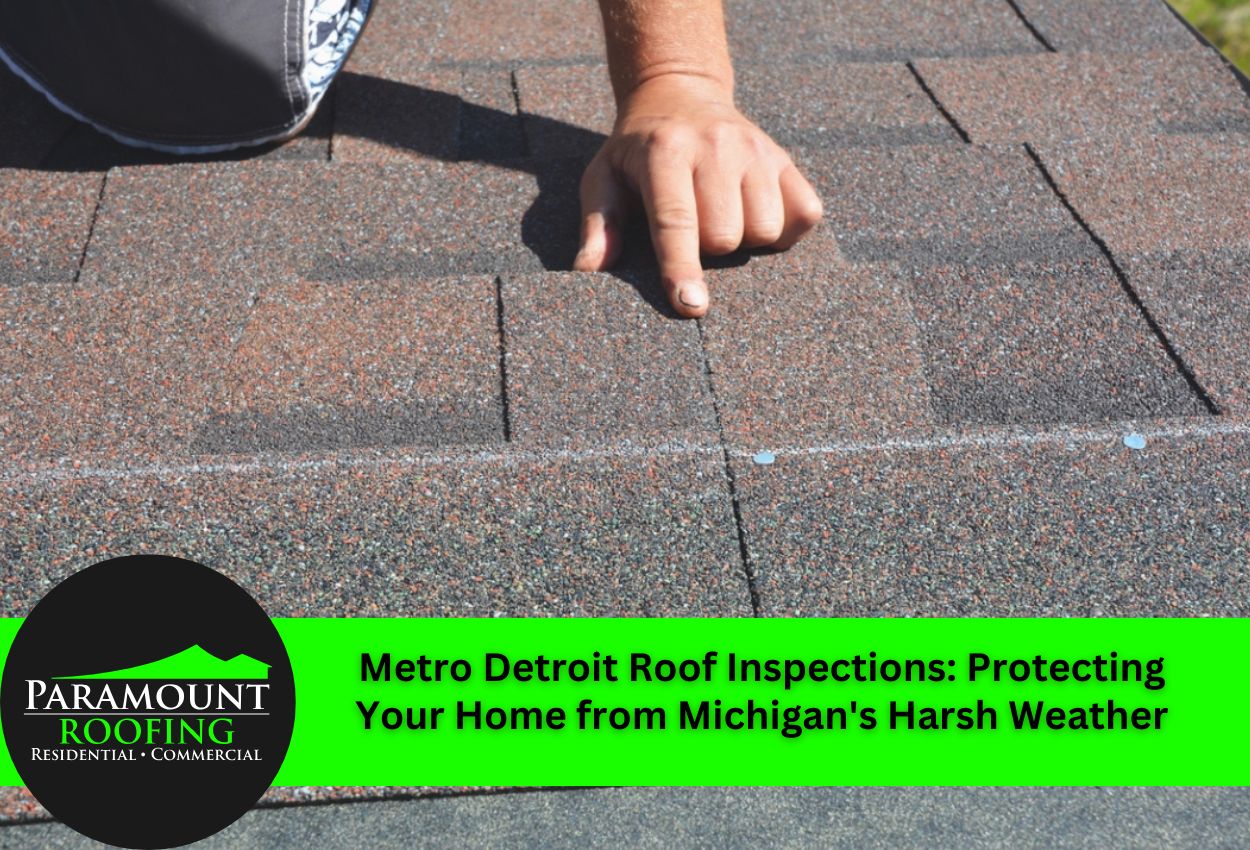Michigan’s unpredictable climate poses unique challenges for Metro Detroit homeowners, with each season bringing potential threats to your roof’s durability. From heavy snow and ice dams in winter to spring’s torrential rains, summer’s intense heat, and fall’s wind-driven debris, your roofing system endures constant stress throughout the year. With all these different weather conditions, roof inspections are not just recommended, they’re essential for Detroit area residents.
Weather-related damage often starts small: a few loose shingles after a windstorm or minor ice dam formation might seem insignificant. However, these minor issues can quickly turn into major structural problems, interior water damage, and expensive emergency repairs when left unchecked. Professional roof inspections help identify these vulnerabilities before they compromise your home’s safety and your wallet.
Understanding how Michigan’s distinct weather patterns affect roofing materials is key to maintaining your home’s most important protective barrier. This comprehensive guide explores the essential aspects of roof inspections in Metro Detroit and how they safeguard your home against our region’s challenging climate.
Common Weather Threats to Detroit Area Roofs
Detroit’s four distinct seasons each bring unique challenges to residential roofing systems. Winter months subject roofs to heavy snow accumulation, with Metro Detroit averaging 45 inches annually. This weight stresses structural integrity while creating perfect conditions for damaging ice dams along roof edges. As temperatures fluctuate, the freeze-thaw cycle forces water into tiny cracks, expanding them into potential leak points.
Spring introduces heavy rains and thunderstorms that test roof water management systems. Asphalt shingles, which are the most common roofing material on Michigan homes, can lose granules during these downpours, reducing their protective capabilities. Summer brings extreme heat and UV exposure that accelerates aging in roofing materials, causing shingles to curl, blister, or crack. Metal roofs typically withstand these conditions better, but require inspection for loose fasteners caused by thermal expansion.
Fall wind events in Metro Detroit can reach 50+ mph, ripping away vulnerable shingles and driving debris that punctures roofing materials. Clogged gutters from autumn leaves cause water to back up, which damages the fascia and soffit areas. Different roofing materials respond uniquely to these seasonal threats—asphalt shingles may show granule loss or curling edges, while metal roofs might develop loose seams during temperature extremes.
Homeowners should watch for warning signs, including water stains on ceilings, missing or damaged shingles, sagging roof sections, and excessive granules in gutters. Catching these indicators early through seasonal roof inspection services prevents minor issues from becoming major structural problems.
Essential Post-Storm Roof Inspection Checklist
After severe weather hits Metro Detroit, conducting a thorough roof inspection becomes critical to prevent small problems from becoming large, expensive repairs. Start your assessment by examining the ground around your home for fallen shingles, broken tiles, or roofing granules, all of which indicate damage that may not be visible from below. When it’s safe to do so, use binoculars to scan your roof from the ground, looking for missing shingles, dented metal, or damaged flashing around chimneys and vents.
Inside your home, check the attic for signs of water intrusion, including wet insulation, water stains on rafters, or daylight visible through the roof deck. Document all findings with dated photographs from multiple angles, which will prove to be valuable for insurance claims. Pay special attention to valleys, edges, and roof penetrations where leaks commonly begin after Michigan storms.
While awaiting professional assessment, protect your home with temporary measures. Cover small damaged areas with tarps secured without nails (which create additional holes), and safely remove debris that might trap moisture against the roof’s surface. Clear gutters to prevent water backup and additional damage during subsequent rainfall.
Remember that winter storms pose unique challenges for a roof inspection, as snow can hide significant damage. Michigan homeowners should watch for unusual icicle formation, which often indicates poor insulation and potential ice dams. Professional storm roof inspection services can safely assess hard-to-reach areas and identify hidden damage that homeowners might miss.
Winter Roof Damage: Special Considerations for Metro Detroit Homes
Winter roof damage is important to talk about on its own since Metro Detroit brings this challenge for residential roofing systems. Ice dam formation occurs when heat that’s escaped from inadequately insulated attics melts snow on the roof surface. This water refreezes at the colder eaves, creating destructive ice barriers that force water beneath shingles. Southeast Michigan homes are particularly vulnerable as the region experiences frequent freeze-thaw cycles during the winter, causing repeated expansion and contraction that can impact roofing materials.
Snow load issues become critical for older Detroit area homes. A single cubic foot of wet snow can weigh over 20 pounds, placing tremendous strain on roofing structures. Flat or low-slope roofs, common in older Metro Detroit neighborhoods, face an increased risk as they provide less opportunity for snow to slide off naturally.
Preventive maintenance is essential for winter roof protection. Before winter arrives, ensure gutters are clear of debris to prevent ice dam formation. Adding attic insulation and improving ventilation helps maintain consistent roof temperatures as well. If you notice snow starting to build up on your roof, you could also consider using a roof rake to safely remove excess snow from the edges (while keeping your feet firmly on the ground).
Professional roof inspections both before and after the winter are particularly important in our region. Trained roofing contractors can identify vulnerable areas, assess flashing and seals around roof penetrations, and spot early signs of winter damage before small issues become major problems requiring extensive repairs.
Finding Hidden Weather Damage: Advanced Inspection Techniques
While standard roof inspections can identify obvious forms of damage, professional roofing contractors use sophisticated methods to detect concealed issues that untrained eyes might miss. Infrared thermal imaging has revolutionized roof inspections in Metro Detroit by revealing temperature differences that indicate trapped moisture beneath the surface. This technology can pinpoint water infiltration long before it becomes visible on interior ceilings, allowing for targeted repairs before structural damage occurs.
Moisture meters provide another critical tool for detecting hidden damage. These devices can identify elevated moisture levels in decking and insulation that aren’t yet visible. For Michigan homes that have weathered multiple freeze-thaw cycles, these readings often reveal compromised areas that would otherwise go unnoticed until significant damage develops.
Core sampling, while more invasive, allows inspectors to examine all the layers of the roof to assess their condition accurately. This technique is particularly valuable for flat roofs, common on Detroit’s commercial buildings and modern residential designs. Drone technology also allows for complete aerial assessments, capturing high-resolution images of difficult-to-access areas without risking inspector safety.
Professional assessments also include attic inspections to evaluate ventilation, insulation condition, and signs of moisture intrusion. Proper attic inspections often reveal the root cause of roofing problems, such as inadequate ventilation that accelerates shingle deterioration. By implementing these advanced inspection techniques, Detroit homeowners can address emerging issues before they require extensive repairs, ultimately extending roof lifespan and protecting their investment.
Professional vs. DIY Roof Inspections: What Detroit Homeowners Should Know
Detroit homeowners face a critical decision when it comes to roof inspections: tackle it yourself or hire a professional. While DIY inspections can help identify obvious issues like missing shingles or clogged gutters, they come with significant limitations. Self-inspections often miss subtle forms of damage that professionals are trained to spot, particularly issues related to Michigan’s harsh freeze-thaw cycles and ice dam formation.
Professional inspectors bring specialized knowledge of local building codes and experience with region-specific problems. They understand how Detroit’s fluctuating temperatures affect different roofing materials and can spot early warning signs of weather-related damage. Additionally, professional inspectors have proper safety equipment and insurance coverage, eliminating the risks associated with climbing ladders and navigating slippery roof surfaces.
When selecting a roof inspector in Metro Detroit, look for contractors with proper licensing, insurance, and certifications from respected roofing associations. Ask about their experience with your specific roofing type and their familiarity with common Michigan roofing issues. Reputable inspectors should provide comprehensive written reports with photographs documenting their findings and clear recommendations for maintenance or repairs.
While DIY seasonal checks have their place in a maintenance routine, Metro Detroit’s extreme weather conditions make professional inspections particularly valuable. Most roofing experts recommend scheduling professional assessments at least once a year, with additional inspections after major storms or extreme weather events to catch potential damage before it gets worse.
Protecting Your Investment: Long-term Roof Maintenance Strategies for Michigan’s Climate
Maintaining your roof in Metro Detroit requires a strategic approach that accounts for our region’s unique seasonal challenges. A well-planned maintenance schedule can significantly extend your roof’s lifespan despite Michigan’s harsh weather conditions. For winter, schedule pre-season inspections in late fall to ensure your roof can handle snow loads and prevent ice dams. Once spring arrives, assess for winter damage to shingles, flashing, and seals that may have occurred during freeze-thaw cycles.
Summer maintenance should focus on checking for UV damage, especially to asphalt shingles that can become brittle in intense heat. Fall inspections are critical for clearing debris and ensuring gutters function properly before winter arrives. This seasonal roof damage prevention approach keeps small issues from becoming major problems.
Professional roofing contractors recommend documenting all maintenance activities in a logbook with dates and specific work performed. This tends to be valuable for warranty purposes and future inspections. Regular maintenance also protects your property value, as potential buyers view a well-maintained roof as a significant asset rather than a looming expense.
Protect Your Home with Paramount Roofing: Expert Roof Inspections in Metro Detroit
Don’t let Michigan’s harsh weather compromise your home’s safety and comfort. Regular roof inspections are important for protection, especially in Metro Detroit, where the weather can be unpredictable and often severe.
Paramount Roofing specializes in identifying and addressing weather-related damages that could lead to costly repairs if left unchecked. Our team of certified professionals uses advanced techniques and equipment to spot hidden damage and provide effective solutions tailored to your roof’s specific needs. Call us today at (586) 690-0227 for a comprehensive roof inspection. Protect your investment and ensure your peace of mind, season after season.
 Free Estimate
Free Estimate
 Request Service
Request Service Locations
Locations 
